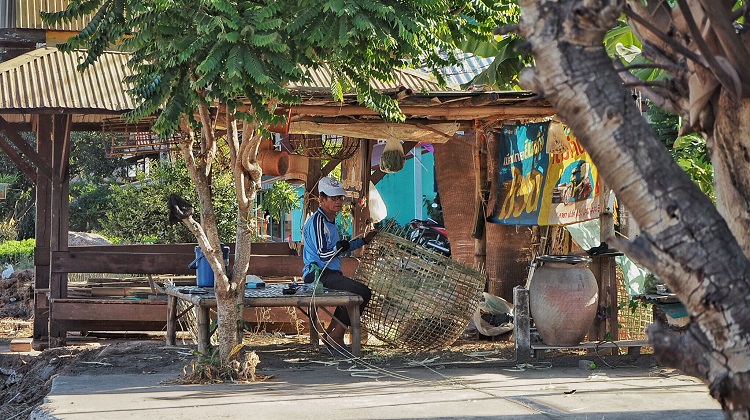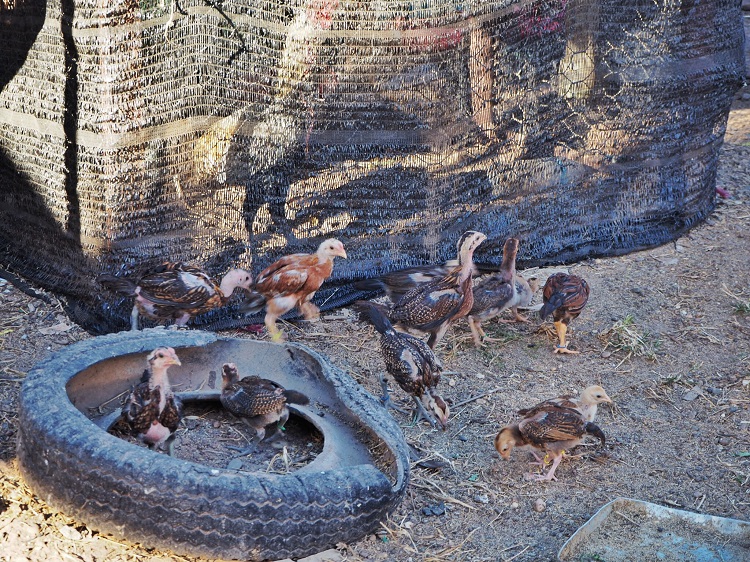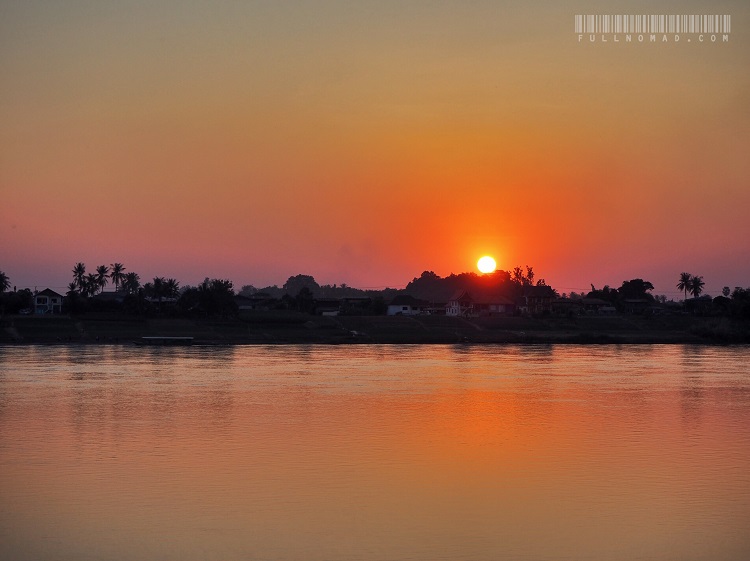Travel teaches us who we are, what we need, where we belong, what we crave, and why. It’s not just a trip here or there that teaches us this, it’s a cumulative experience. The more you do, the more you see, the more you understand.
Not just about the world, or you, but your place within it. It’s contrast and context. Timing, place, circumstance, momentum – everything affects the outcome.
The experience of place you have somewhere will not equal my experience, because who I meet, what I do, the climate, the currency, the timing, the luck – every single factor tempers each of our experiences. That’s why it’s such an individual experience and why travel itself is so complicated.

One of the gorgeous sunsets from my tiny Thai village of Mueang Mi, just outside of Nong Khai in Issan Province.
I know so many people who travel according to what they think they like as opposed to being curious and trying out locations and lifestyles they’ve never known.
Growing up in a small town, one may think that’s where they belong, or they may feel it’s holding them back, a prison. Being the city type, another might believe they need that constant stimulation and bustle around them, but it may just be they’ve never known any different, so they exclude possibility rather than embracing chance.
I see people travelling who only ever have one kind of experience, city after city, and I wonder how much it’s teaching them about themselves. It’s like those folks I know who hate to be alone, who think it’s weird to dine solo in a restaurant. How can you know until you’ve really bought into the experience, until you’ve thrown those ambivalences aside to be truly present in that solo experience?

Man weaves a basket in Mueang Mi Village.
I sit here today, cocks crowing in the distance, the occasional vroom-vroom-putputput-sputter of motorcycles roaring down my street then turning on my corner. Palms and other tropical trees I’ve yet to name rustle in the ever-present Mekong River wind. The only other sound is that of my keyboard clacking in the pastoral silence.
Before arriving here on Friday, I worried, would this rural Thai life be something I’m ill-suited to? Would I have bugs in my house all the time? Would I feel conspicuous and judged on these rural streets, as being an invading foreigner? Could I handle the silence, the isolation?
48 hours later, I wonder what took me so long. For the first time in God knows how long, I hear myself think. I feel peaceful. I’m curious about the locals. I’m happy.
But I had to come here to know that this could be my kinda jam.

Pretty sure the chicken to human population here is at least 1:1.
What other lifestyles do I need to try on for size? And where? What cultures and places and experiences will speak to my soul as if I’ve spent a lifetime evading a truth I didn’t know was mine?
We live in a world today where extremism and nationalism are taking hold in daunting, scary ways, and there’s nothing I’d enjoy more than to see the whole world handed passports, travel funds, and told to go somewhere 180 degrees different from everything they’ve experienced. Go, live that, then tell me you hate the other. Then tell me you don’t understand people, or you’re scared, or you’re threatened.
Travel as I do, and you’ll learn how much we’re alike. Every country has parents who’d die for their kids and parents who are indifferent. Mostly, it’s the former. Every country has good drunks, bad drunks, and those who abstain. Every country has people struggling to make ends meet no matter what their cost of living index is.
We are not so different.
What we are, however, is ignorant. We all have some concept or delusion of how others live.
We’re often misguided about where we belong, how we should live, how we can adapt. These are lessons we learn as we collect moments. The more we travel, the faster we learn these things about ourselves and our world. The more moments and contrasts we collect, the more we know of who we are and how encompassing our worldview can be.

Fish farmer lowers his feed to the Mekong River.
The nomad life and its infinite change and growth and constant lessons is, at times, overwhelming. Ferris Bueller has become a modern philosophical gem with the line about how “life moves pretty fast. If you don’t stop and look around once in awhile, you could miss it.”
My nomad life has proven this true. I’ve moved so much so often that I’m at risk of forgetting all my experiences. I have needed to stop, slow down, and experience something less chaotic, so here I am. I’ve never been so excited to be bored.
“Where” is in a small village of a thousand or two, eight kilometres from a town of 40,000, an hour from a city of 100,000. I would suspect the chicken population here rivals that of the humans. Everyone grows something in their yards. Mothers hang woven bassinettes on their porches and swing their toddlers in the breeze. Fish farmers work the waterfront. The odd cattle stroll fields. Greenery abounds. Monks bang their gongs and drums, singing their prayers. Dirt roads are a thing. Restaurants are close at hand and don’t charge to deliver. Shops keep little on shelves, bare necessities and some snacks, but fewer things like potato chips, which are pricey imports that don’t have as much appeal in this place, agriculture is a career for many.
My home is on a small lime tree plantation. 150 lime trees and a crop of cilantro, as Southeast Asian as it gets. Lime, it turns out, repels mosquitoes, making me even happier here. The landlord lives next door, in a traditional wooden house with a sprawling luxurious covered patio facing the river. He bought the home for a song when a Western police chief built it to retire with his Thai wife. She wouldn’t move into it though, on account if it being far from town and on the river. The river, she said, was teeming with spirits who would emerge to haunt them. The Buddhist wat just over yonder, too, was a spirit-filled place where bodies were cremated. No spirithouse on the property’s edge could possibly appease so many dead. She would not, she insisted, move in.
So, for 25 years, my landlord from Columbus, Ohio, has called this home. I can see how he would be so happy to retire here at 55. What a wonderful lifestyle to enjoy.

The sun sets over a lightly foggy Mekong.
As for the ghosts, well, I can’t explain the thumping I heard last night, but I turned up the television and ignored it. Today I took a gander around the home’s perimeter and no trees are near enough to thump the walls. Perhaps spirits do linger on this river. So long as they, too, don’t see me as an invading white devil, I’m okay with that.
The 12th-longest river in the world, stretching from the southern tip of Vietnam all the way up into China, more than 60 million people live along the Mekong River, with 40% of that being within 15 kilometres of its banks. For 2,500 years, this river has driven culture, economy, and sustenance through this region. It’s brought invaders and warriors and riches and floods. People have died in the river, been killed in the river, and disposed of in its currents. If there be spirits, then there be spirits.
But all I feel is peace.
At no time in my life, though, did I ever foresee myself living in a lime tree plantation on the banks of one of the world’s great rivers. I didn’t see myself excited to have papaya salads and gapao moo delivered to me. I didn’t predict that I’d be scheming to drop by a little school to teach English to kids.
For now, there’s no place or lifestyle or future I’d rather be experiencing.
And you? Don’t limit yourself to travel that is, like the Thai say, same same but different. Maybe something that speaks to your soul is out there waiting for you to discover it. Try the quiet life, the busy life, the isolated life. Try everything.


